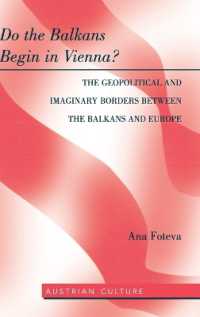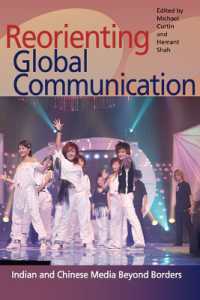- ホーム
- > 洋書
- > 英文書
- > Literary Criticism
基本説明
New in paperback. Hardcover was published in 2005. Translated by M. B. DeBevoise. Casanova shows us the state of world literature behind the stylistic refinements - a world of letters relatively independent from economic and political realms, and in which language systems, aesthetic orders, and genres struggle for dominance.
Full Description
The "world of letters" has always seemed a matter more of metaphor than of global reality. In this book, Pascale Casanova shows us the state of world literature behind the stylistic refinements--a world of letters relatively independent from economic and political realms, and in which language systems, aesthetic orders, and genres struggle for dominance. Rejecting facile talk of globalization, with its suggestion of a happy literary "melting pot," Casanova exposes an emerging regime of inequality in the world of letters, where minor languages and literatures are subject to the invisible but implacable violence of their dominant counterparts.
Inspired by the writings of Fernand Braudel and Pierre Bourdieu, this ambitious book develops the first systematic model for understanding the production, circulation, and valuing of literature worldwide. Casanova proposes a baseline from which we might measure the newness and modernity of the world of letters--the literary equivalent of the meridian at Greenwich. She argues for the importance of literary capital and its role in giving value and legitimacy to nations in their incessant struggle for international power. Within her overarching theory, Casanova locates three main periods in the genesis of world literature--Latin, French, and German--and closely examines three towering figures in the world republic of letters--Kafka, Joyce, and Faulkner. Her work provides a rich and surprising view of the political struggles of our modern world--one framed by sites of publication, circulation, translation, and efforts at literary annexation.
Contents
Preface to the English-Language Edition Introduction: The Figure in the Carpet Part I: THE LITERARY WORLD 1. Principles of a World History of Literature The Bourse of Literary Values Literature, Nation, and Politics 2. The Invention of Literature How to "Devour" Latin The Battle over French The Cult of Language The Empire of French The Herderian Revolution 3. World Literary Space Roads to Freedom The Greenwich Meridian of Literature Literary Nationalism National versus International Writers Forms of Literary Domination 4. The Fabric of the Universal The Capital and Its Double Translation as Litterarisation Language Games The Importance of Being Universal Ethnocentrisms Ibsen in England and in France 5. From Literary Internationalism to Commercial Globalization? Part II. LITERARY REVOLTS AND REVOLUTIONS 6. The Small Literatures Literary Destitution Political Dependencies National Aesthetics Kafka and the Connection with Politics 7. The Assimilated Naipaul: The Need to Conform Michaux: What Is a Foreigner? Cioran: On the Inconvenience of Being Born in Romania Ramuz: The Impossible Assimilation 8. The Rebels Literary Uses of the People National Tales, Legends, Poetry, and Theater Legacy Hunting The Importation of Texts The Creation of Capitals The International of Small Nations 9. The Tragedy of Translated Men Thieves of Fire Translated from the Night Comings and Goings Kafka: Translated from Yiddish Creators of Languages Literary Uses of the Oral Language Andrade: The Anti-Camoes Swiss Creoleness 10. The Irish Paradigm Yeats: The Invention of Tradition The Gaelic League: Recreation of a National Language Synge: The Written Oral Language O'Casey: The Realist Opposition Shaw: Assimilation in London Joyce and Beckett: Autonomy Genesis and Structure of a Literary Space 11. The Revolutionaries Dante and the Irish The Joycean Family The Faulknerian Revolution Toward the Invention of Literary Languages Conclusion: The World and the Literary Trousers Notes Index








